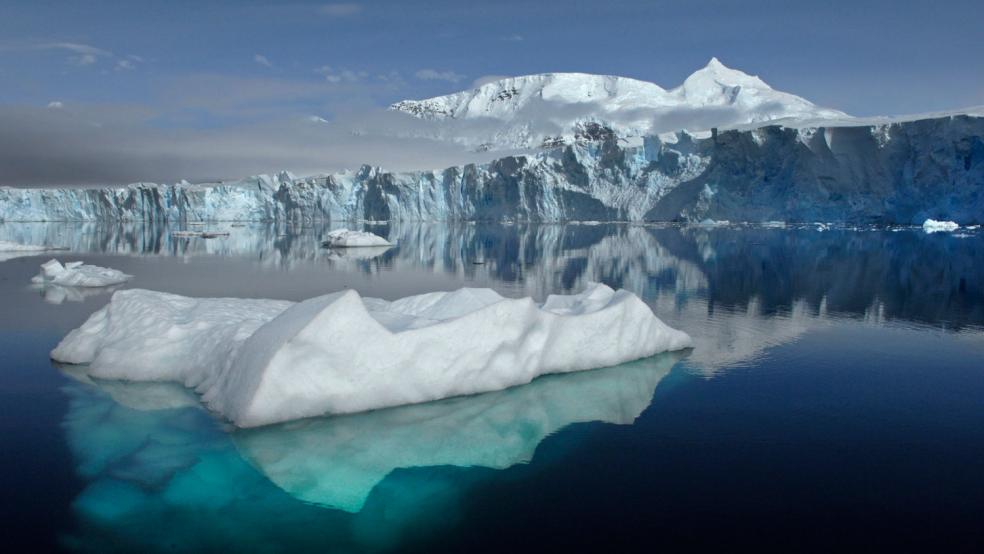Republican presidential frontrunner Donald Trump frequently scoffs at President Obama for proclaiming global warming one of the greatest threats to the U.S. – perhaps even greater than ISIS and global terrorism.
“I think that’s one of the dumbest statements I’ve ever heard in politics – in the history of politics as I know it, which is pretty good,” Trump once said on MSNBC’s Morning Joe.
Related: Obama: This May Be ‘The Last Generation’ That Can Stop Climate Change
Trump, a skeptic about climate change, says he’s more concerned about saving jobs in industry than aggressively combating industrial emissions to reduce global warming. “I am not a believer in climate change,” he said last fall.
Obama has said in so many words that Trump doesn’t know what he’s talking about on a wide range of topics, including national security, trade, NATO and foreign policy. And in a sense, he delivered a rejoinder to Trump’s views on global warming on Monday with the release of a 300-page report, “The Impacts of Climate Change on Human Health in the United States: A Scientific Assessment.”
The exhaustive study, which was reviewed by the National Academies of Science, adds to a body of compelling evidence that if left unchecked, climate change poses a devastating threat to public health in the coming decades -- especially deaths among the poor, children and the elderly from extreme heat, insect-borne diseases and asthma.
The report, prepared by federal agencies and White House advisers over the past three years, cautions that as greenhouse gases continue to alter the climate, “the risks to human health will grow….”
Related: Obama Warns of Costly Public Health Crisis Spurred by Climate Change
“This isn’t just about glaciers and polar bears. It’s about the health of our family and our kids,” said Gina McCarthy, administrator of the Environmental Protection Agency said in an article in The Washington Post.
The release of the report coincides with National Public Health Week and is the latest in a series of administration pronouncements on the long-term costs of global warming to the economy, public health and coastal areas and natural resources. Obama has made combating global warming one of his signature domestic and foreign policy initiatives.
The president’s major proposal for reducing industrial carbon emission, the so-called Clean Power Plan, has been challenged in court by a number of states. The plan constitutes the heart of the administration’s commitment to a global climate change strategy that was worked out by world leaders in Paris late last year.
While the new White House report is far ranging, here are seven of its major findings regarding the long-term public health risks of climate change:
Related: Obama and Critics Battle Over Climate Change Costs
- The number of premature deaths will rise from thousands to tens of thousands annually because of extreme summer heat. According to one estimate using 1990 mortality levels in 200 U.S. cities as the baseline, there will be an additional 11,000 heat-related deaths during the summer of 2030 and 27,000 more deaths in 2100.
- Air pollution and airborne allergens will lead to a sharp increase in allergies and asthma. “Future ozone-related human health impacts attributable to climate change are projected to lead to hundreds to thousands of premature deaths, hospitalizations, and cases of acute respiratory illnesses each year in the United State by 2030, including increases in asthma episodes and other adverse respiratory effects in children,” the report stated.
- We can expect to see an earlier annual onset of Lyme disease cases in the eastern U.S because of warmer winter and spring temperatures. Already climate change is having an effect. The number of reported cases of Lyme disease and their distribution increased in the Northeast and Upper Midwest between 2001 and 2014.
- Unseasonably warm weather will increase the exposure of food and crops to certain pathogens and toxins that can threaten the food supply. The combination of rising temperatures and flooding will lead to the increased likelihood of food contamination and human exposure to pathogens and toxins.
Related: Cities Face Costly Projects to Cope with Climate Change
- The most vulnerable populations will suffer the largest adverse health effects of climate change. They include low-income families, minority communities, immigrants, children, pregnant women, older Americans, the disabled and people in occupations that are highly vulnerable to the weather.
- Air quality will be threatened, as climate change will affect the levels and location of outdoor air pollutants, such as ground-level ozone and fine particulate matter that can easily penetrate the lungs. “These changes in ozone are projected to lead to hundreds to thousands of premature deaths, hospital admissions, and cases of acute respiratory illnesses per year in the United States in 2030,” according to the report.
- Get ready for more intense droughts, wildfires, flooding, hurricanes and heavy rains because of climate change. Many of these extreme events will disrupt or destroy critical infrastructure, including public transportation, water systems and emergency communications.





